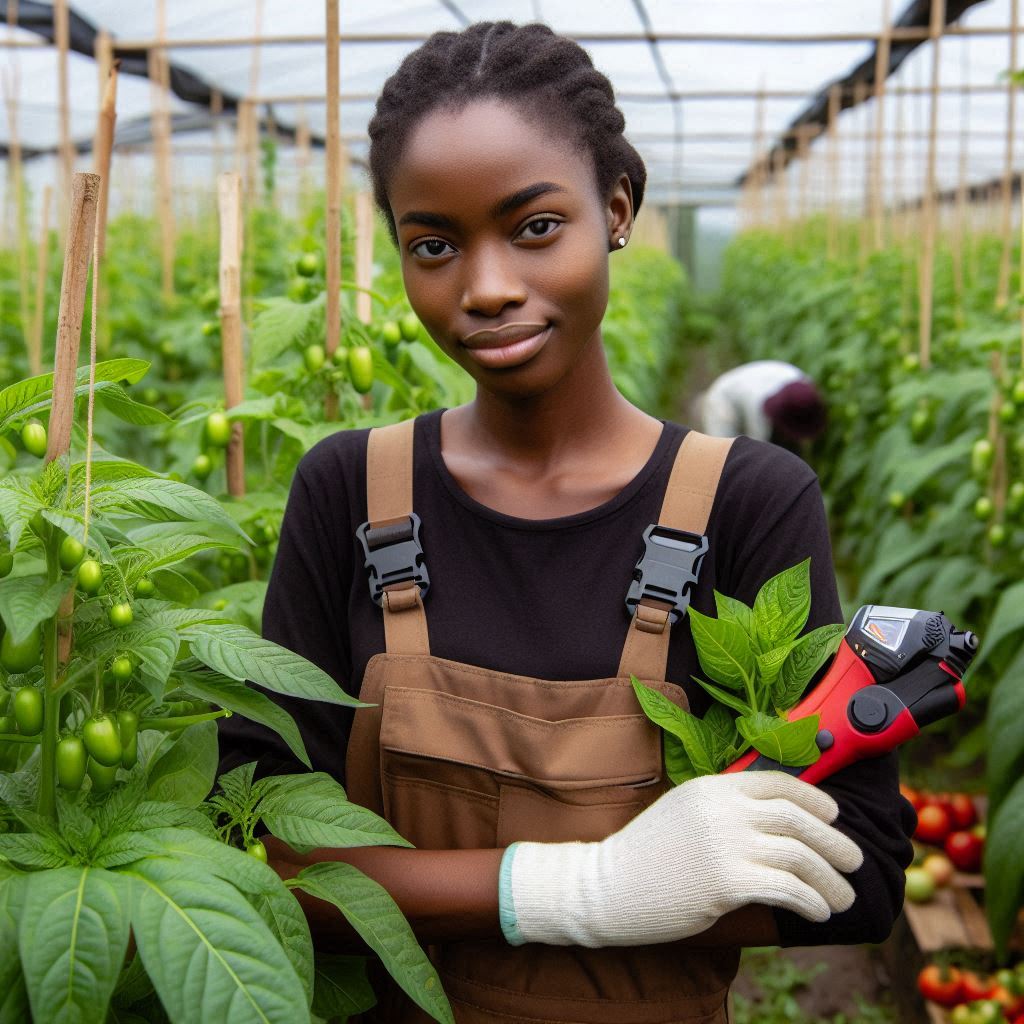Introduction
Educational pathways for aspiring plant breeders in Nigeria are crucial for advancing agriculture and ensuring food security. Plant breeders develop high-yielding, resilient, and nutritious crops, directly impacting agricultural productivity and sustainability.
Nigeria faces challenges like climate change, pests, and diseases, increasing the demand for skilled plant breeders. Understanding the educational pathways helps aspiring breeders gain the necessary knowledge and skills to address these challenges effectively.
Plant breeders use traditional and modern techniques to create crop varieties that meet farmers’ and consumers’ needs. By pursuing relevant education and training, they drive innovations that enhance crop production and resilience, contributing to sustainable agriculture.
Educational pathways include undergraduate and postgraduate degrees in fields like agronomy, plant science, and biotechnology. Practical experience through internships and research projects is crucial for developing hands-on skills.
Continuous professional development through workshops, seminars, and short courses helps breeders stay updated with the latest advancements.
In this blog, we will explore these educational pathways and opportunities for aspiring plant breeders in Nigeria.
Educational Requirements
To become a plant breeder in Nigeria, aspiring professionals need specific academic qualifications. A strong educational foundation is essential for understanding the complex processes involved in plant breeding.
Undergraduate Education
The journey typically begins with an undergraduate degree. Most aspiring plant breeders pursue a Bachelor of Science (B.Sc.) in Agriculture, Agronomy, Plant Science, or a related field.
These programs provide a broad understanding of agricultural principles and practices, forming the basis for more specialized study.
Studying agriculture introduces students to crop production, soil science, pest management, and agricultural economics. These subjects are crucial for understanding the broader context in which plant breeding operates.
Core Courses
In addition to general agricultural courses, aspiring plant breeders should focus on biology and genetics. A strong grasp of biology helps students understand plant physiology, anatomy, and developmental processes.
Genetics courses are particularly important, as they teach the principles of heredity, gene expression, and genetic variation.
Plant breeding requires a deep understanding of how genetic traits are passed from one generation to the next. Knowledge of genetics enables breeders to select and combine desirable traits to create superior plant varieties.
Specialized Plant Breeding Courses
Courses in plant breeding are essential. These specialized courses cover breeding techniques, biotechnology, and molecular biology. They equip students with the tools and methods needed to develop new crop varieties.
Biotechnology plays a critical role in modern plant breeding. Courses in this area teach students how to use genetic modification, tissue culture, and marker-assisted selection to enhance crop traits.
Postgraduate Education
For those seeking advanced knowledge, a postgraduate degree is often necessary. A Master of Science (M.Sc.) or Doctor of Philosophy (Ph.D.) in Plant Breeding, Genetics, or Biotechnology allows students to specialize further.
Postgraduate programs involve intensive research and practical training. Students work on projects that address real-world agricultural problems, gaining hands-on experience in developing new plant varieties.
Research Experience
Research experience is crucial for aspiring plant breeders. Participating in research projects during undergraduate and postgraduate studies provides practical skills and insights. It also helps students stay updated with the latest advancements in the field.
Importance of Multidisciplinary Study
Plant breeding is inherently multidisciplinary. Knowledge in agriculture, biology, genetics, and plant breeding is essential. Courses in statistics, bioinformatics, and agricultural engineering are also beneficial.
They provide additional skills needed for data analysis and the application of new technologies in breeding programs.
Practical Training and Internships
Practical training and internships offer invaluable experience. Working in research institutions, agricultural firms, or government agencies allows students to apply theoretical knowledge in real-world settings.
These experiences also help build professional networks and improve employment prospects.
Basically, becoming a plant breeder in Nigeria requires a comprehensive educational background. Academic qualifications in agriculture, biology, genetics, and plant breeding are crucial.
Specialized courses and research experience enhance knowledge and skills. By pursuing these educational pathways, aspiring plant breeders can contribute significantly to Nigeria’s agricultural development and food security.
Read: Horticulture and Food Security in Nigeria
Training Programs
Aspiring plant breeders in Nigeria have access to various training programs to enhance their skills.
Local Training Programs
Several local institutions offer specialized training in plant breeding. Universities such as Ahmadu Bello University, University of Ibadan, and Federal University of Agriculture, Abeokuta, provide courses in plant breeding as part of their agricultural science programs.
These programs cover breeding techniques, genetics, biotechnology, and fieldwork. They equip students with the knowledge and practical skills needed to succeed in plant breeding careers.
International Training Programs
For those seeking broader perspectives, international training programs are available. Institutions like the International Institute of Tropical Agriculture (IITA) and the Africa Rice Center (AfricaRice) offer training courses and workshops in plant breeding and related fields.
These programs often include hands-on training, seminars, and field visits. They provide opportunities to learn from experts in the field and gain insights into global plant breeding practices.
Collaborative Programs
Collaborative programs between local and international institutions are also beneficial. These programs leverage the expertise of both local and international faculty members, offering comprehensive training in plant breeding.
Partnerships with organizations like the Consultative Group on International Agricultural Research (CGIAR) and the Alliance for a Green Revolution in Africa (AGRA) facilitate access to training resources and expertise.
Research Fellowships
Research fellowships are another avenue for aspiring plant breeders to gain practical experience.
Organizations such as the International Maize and Wheat Improvement Center (CIMMYT) and the International Center for Agricultural Research in the Dry Areas (ICARDA) offer fellowships for research in plant breeding and related disciplines.
These fellowships provide opportunities for hands-on research in diverse environments, exposing participants to different crops and breeding challenges.
Online Courses
In addition to traditional training programs, online courses offer flexible learning options for aspiring plant breeders. Platforms like Coursera, edX, and FutureLearn offer courses in genetics, biotechnology, and plant breeding.
These courses cover fundamental concepts and advanced topics, allowing learners to enhance their knowledge at their own pace.
Therefore, aspiring plant breeders in Nigeria have access to a variety of training programs. Local universities offer specialized courses in plant breeding, while international institutions provide broader perspectives and opportunities for collaboration.
Research fellowships and online courses offer additional avenues for learning and skill development.
By taking advantage of these training opportunities, aspiring plant breeders can acquire the knowledge and expertise needed to contribute to Nigeria’s agricultural development and food security.
Read: Innovations in Nigerian Horticulture
Gain More Insights: Wildlife Management Techniques Used in Nigeria
Discover More: Pasture and Range Management Research Centers in Nigeria
Professional Opportunities
Plant breeders in Nigeria have diverse career opportunities available to them.
Career Opportunities
Plant breeders can work in various sectors, including agricultural research institutions, government agencies, seed companies, and non-governmental organizations.
They play essential roles in developing new crop varieties, improving agricultural practices, and ensuring food security.
Roles and Responsibilities
Plant breeders are responsible for identifying desirable traits in crops and developing breeding strategies to enhance those traits. They conduct experiments, analyze data, and select superior plant varieties for further development.
In agricultural research institutions, plant breeders lead research projects aimed at improving crop productivity, resilience, and nutritional content.
They collaborate with scientists from different disciplines to integrate biotechnological advancements into breeding programs.
Government agencies rely on plant breeders to develop policies and initiatives that promote agricultural development and food security. Plant breeders provide expertise in crop improvement strategies and advise policymakers on the adoption of new technologies.
Seed companies employ plant breeders to develop and commercialize new crop varieties. They conduct field trials, evaluate crop performance, and ensure that seeds meet quality standards before they are released to farmers.
Transform Your Career with Expert Guidance
Get personalized mentorship consulting that’s tailored to your unique path. Our expert advice is actionable and exclusive.
Get StartedNon-governmental organizations often engage plant breeders in projects aimed at improving smallholder agriculture and addressing food insecurity.
Plant breeders work with local communities to develop crop varieties that are adapted to local growing conditions and farming practices.
Ultimately, plant breeders in Nigeria have diverse career opportunities in agricultural research, government, seed companies, and non-governmental organizations.
They play vital roles in developing new crop varieties, improving agricultural practices, and ensuring food security. By leveraging their expertise and skills, plant breeders contribute significantly to Nigeria’s agricultural development and economic growth.
Read: Hydroponics in Nigerian Horticulture

Explore Further: Top Universities Offering Pasture Management Courses in Nigeria
Skills and Competencies
To succeed as a plant breeder in Nigeria, certain skills and competencies are essential.
Essential Skills
- Knowledge of Genetics: A solid understanding of genetics is fundamental for plant breeders. They must comprehend the principles of inheritance, genetic variation, and breeding methodologies.
- Plant Biology: Proficiency in plant biology is crucial. Plant breeders need to understand plant anatomy, physiology, and developmental processes to manipulate traits effectively.
- Data Analysis: Analytical skills are vital for interpreting research data. Plant breeders must be proficient in statistical analysis to evaluate breeding outcomes accurately.
- Problem-Solving: Plant breeders encounter various challenges in their work. Strong problem-solving skills enable them to devise innovative solutions to improve crop traits and overcome obstacles.
- Communication: Effective communication skills are essential for plant breeders to convey research findings, collaborate with colleagues, and engage with stakeholders.
- Attention to Detail: Plant breeding involves meticulous attention to detail. Breeders must carefully observe plant characteristics and accurately record data to inform breeding decisions.
- Critical Thinking: Critical thinking skills are essential for evaluating breeding strategies and assessing the potential impact of new crop varieties on agricultural productivity and sustainability.
Importance of Hands-On Experience
Hands-on experience and practical skills are invaluable for plant breeders in Nigeria.
- Fieldwork: Fieldwork provides plant breeders with firsthand experience of crop performance under different environmental conditions. It allows them to observe plant traits, collect data, and make informed breeding decisions.
- Laboratory Techniques: Proficiency in laboratory techniques is essential for conducting experiments and analyzing plant samples. Plant breeders must be skilled in molecular biology, tissue culture, and other advanced techniques.
- Trial Design and Management: Planning and managing field trials is a critical aspect of plant breeding. Breeders need practical experience in designing trials, implementing protocols, and collecting reliable data.
- Crop Management: Understanding crop management practices is essential for plant breeders. They must have practical knowledge of soil management, irrigation, pest control, and other agronomic practices to optimize crop performance.
- Collaboration: Collaborating with multidisciplinary teams is common in plant breeding. Practical experience in teamwork and collaboration enhances communication skills and fosters a collaborative work environment.
In review, aspiring plant breeders in Nigeria must develop a diverse set of skills and competencies to succeed in their field.
A strong foundation in genetics, plant biology, data analysis, problem-solving, communication, attention to detail, and critical thinking is essential.
Additionally, hands-on experience and practical skills gained through fieldwork, laboratory techniques, trial design and management, crop management, and collaboration are invaluable for plant breeders to make meaningful contributions to agricultural development and food security in Nigeria.
Read: Field Work & Practical Training in Nigerian Forestry Schools
Conclusion
In wrapping up, the journey to becoming a plant breeder in Nigeria is rich with educational opportunities. From undergraduate studies in agriculture, genetics, or biotechnology to postgraduate degrees specializing in plant breeding, there are numerous paths to explore.
Local institutions like Ahmadu Bello University and the University of Ibadan offer specialized courses, while international collaborations with institutions such as the International Institute of Tropical Agriculture broaden horizons.
Hands-on experience is paramount, whether through fieldwork, laboratory experiments, or collaborative research projects.
Aspiring plant breeders should cultivate a diverse skill set encompassing genetics, plant biology, data analysis, problem-solving, and effective communication. These skills, coupled with practical experience, form the foundation for success in the field.
I urge budding plant breeders to embrace their passion and actively seek out educational opportunities. By doing so, they not only enrich their own knowledge but also contribute significantly to Nigeria’s agricultural development and food security.




